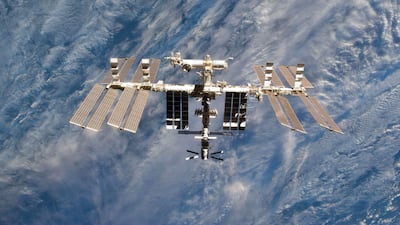Space experts are criticising Russia’s anti-missile test that spewed thousands of pieces of space debris around Earth’s orbit.
On Monday night, astronauts aboard the International Space Station (ISS) had to seek emergency shelter, on account of the debris created by the satellite break-up.
The US Space Command said the test struck the Cosmos 1408 satellite, creating more than 1,500 orbital debris pieces, which are expected to generate hundreds of thousands of smaller pieces.
“Russia has demonstrated a deliberate disregard for the security, safety, stability and long-term sustainability of the space domain for all nations,” US Army General James Dickinson, a commander at US Space Command, said in a statement.
“The debris created by Russia's DA-ASAT [direct-ascent anti-satellite missile test] will continue to pose a threat to activities in outer space for years to come, putting satellites and space missions at risk, as well as forcing more collision avoidance manoeuvres. Space activities underpin our way of life and this kind of behaviour is simply irresponsible.”
Last week, the ISS was forced to change course after debris created by a Chinese anti-satellite missile test entered the flight path of the space station.
Experts have been voicing concerns over the growing problem of space debris, as Earth’s orbit becomes more crowded.
There are about 2,700 active satellites that share orbits with 8,800 tonnes of space debris, according to the European Space Agency. The debris includes thousands of discarded rocket stages and defunct satellites.
Space debris can collide with the space station or satellites, threatening the lives of astronauts and causing disruption to internet services, Earth imaging and weather monitoring.
In June, a piece of space debris hit the space station, leaving a hole in the lab’s robotic arm.
Private companies working in space also criticised Russia’s anti-satellite test at the Dubai Airshow’s Space Forum on Tuesday.
Jean-Marc Nasr, head of space systems at Airbus Defence and Space, said that countries need to responsibly de-orbit their satellites — bring satellites down to burn up in the atmosphere or move them to a safe orbit — to prevent space debris.

“I wish all countries in the world understand that they should de-orbit satellites at the end of their lifetime and not leave anything dirty in orbit as we do in our oceans”, he told The National.
“I hope what happened is a wake-up call for each and every country because we cannot afford to do this.”
Airbus satellites are deliberately manoeuvred to burn up in the atmosphere or are sent into “graveyard orbit” where no other satellites are crossing.
Mr Nasr said there needs to be a global law that ensures countries are being responsible in space in their own way.
“This needs to be done by everybody. It has to be the law for everyone because in about 10 years there could be approximately 50,000 satellites in orbit. We just can’t afford to go wrong or there will be no safe place in orbit.”























